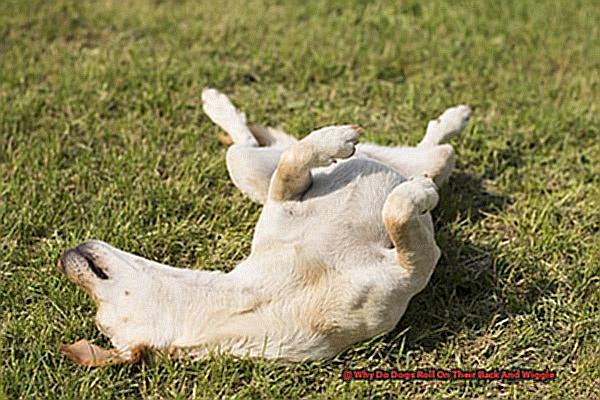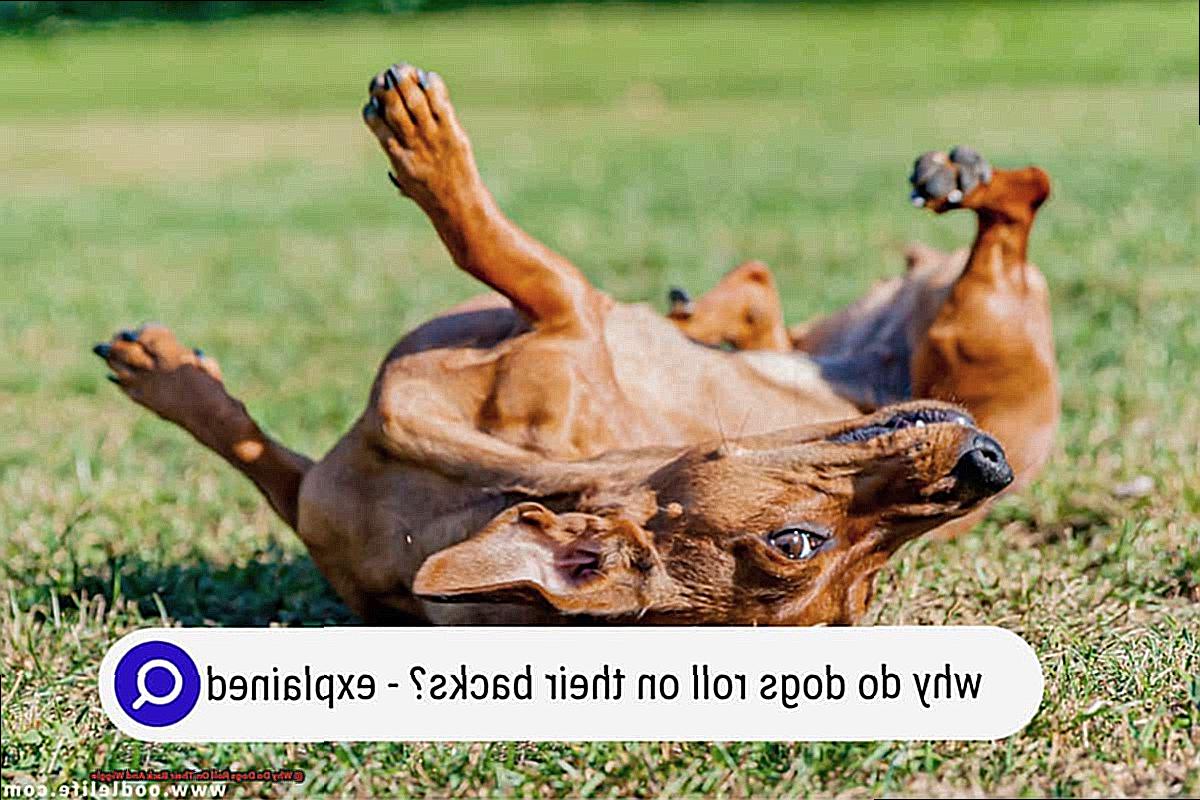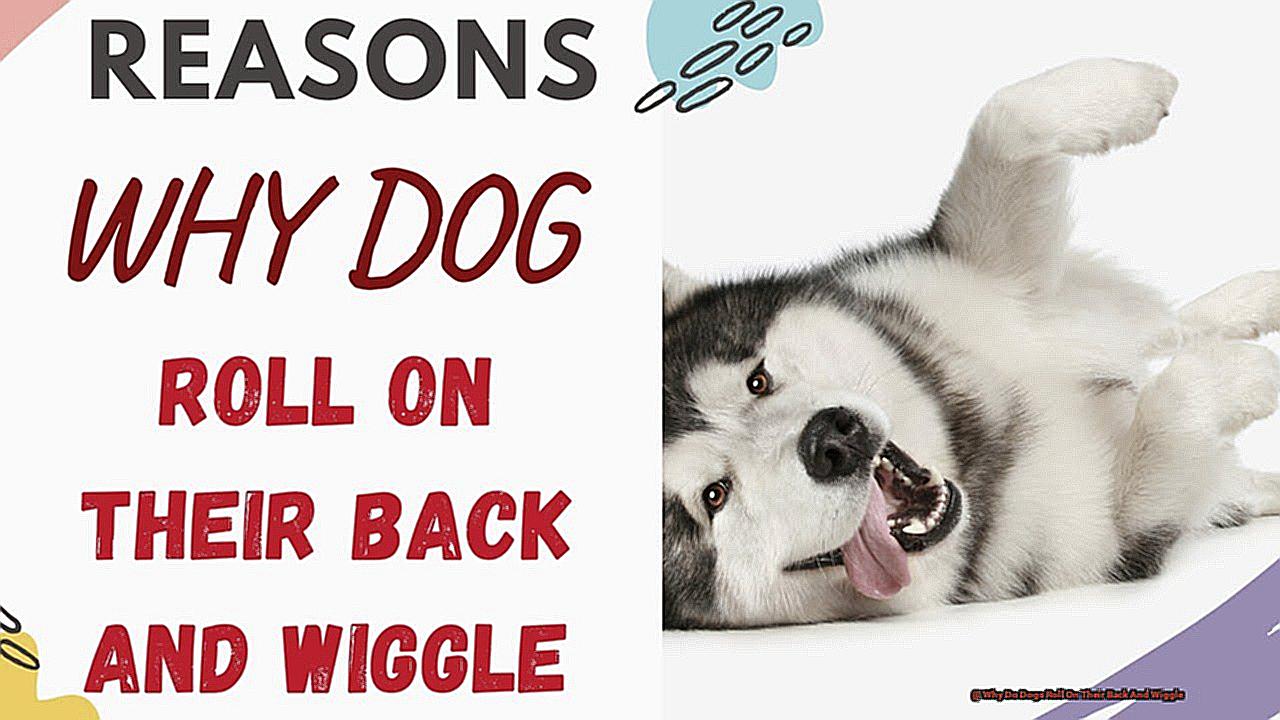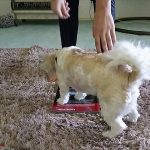Why Do Dogs Roll On Their Back And Wiggle?
Picture this: you’re out for a walk with your furry best friend when suddenly, they flop onto their back and start wiggling with delight.
It’s a familiar sight for most dog owners, but have you ever wondered why they do it? Is it just a silly quirk or is there more to it?

So, let’s take a closer look at why dogs roll on their back and wiggle – from ancient instincts to social cues, get ready to uncover the secrets behind this adorable habit.
Why Do Dogs Roll On Their Back And Wiggle?
Contents
- 1 Why Do Dogs Roll On Their Back And Wiggle?
- 2 The Instinctive Need for Submission in Dogs
- 3 Cooling Down: How Dogs Use This Behavior to Regulate Body Temperature
- 4 Relieving Discomfort: Using the Belly as a Tool for Scratching Itches
- 5 Stretching and Preparing for Activity: The Purpose of Post-Nap Wiggles
- 6 Attention-Seeking Behavior: Why Some Dogs Roll on Their Backs for Playtime
- 7 Understanding and Appreciating This Behavior in French Bulldogs
- 8 Conclusion
This behavior is not only adorable but also serves various purposes for our canine companions. So why do dogs roll on their back and wiggle? Let’s dive into the reasons behind this curious behavior.
Submission and Trust
One of the main reasons why dogs roll on their back and wiggle is to show submission to a dominant pack member or owner. This behavior dates back to their wild ancestors, who had a strict hierarchy within the pack. By exposing their vulnerable belly, dogs are indicating that they trust and submit to the dominant member. This act of submission also helps to maintain harmony within the pack and avoid any potential conflicts.
Inviting Playtime or Social Interaction
Have you ever noticed your dog rolling on their back and wiggling when they see another dog or a person? This is often a sign that they want to play or engage with them. This behavior is especially common in younger dogs who are full of energy and constantly seeking attention and interaction. It’s their way of saying “let’s play.” So next time your pup does this, grab their favorite toy and have some fun together.
Cooling Down
Rolling on their back and exposing their belly can also serve as a way for dogs to cool down on a hot day. The belly is an area with less fur and a lot of blood vessels, making it an ideal spot for heat exchange. By exposing their belly to the cool air or ground, dogs can regulate their body temperature and cool down quickly. This is especially beneficial for breeds like French Bulldogs, who may struggle with overheating due to their thick coats.
Showing Fear or Anxiety
While rolling on their back and wiggling is often seen as a playful behavior, it can also indicate fear or anxiety in some cases. If your dog is consistently displaying this behavior when approached by other dogs or people, it may be a sign that they are feeling uncomfortable or threatened.
It’s essential to pay attention to your dog’s body language and intervene if necessary to ensure their safety and well-being.
The Instinctive Need for Submission in Dogs
As a French Bulldog owner, you may have noticed your furry friend’s adorable behavior of rolling on their back and wiggling. It’s a cute sight, but have you ever wondered what it means?
As an expert on the instinctive behaviors of dogs, I am here to share with you the reasons behind this behavior and how it contributes to maintaining social order and showing trust and affection towards their owners.
The Pack Mentality
First and foremost, it’s essential to understand that dogs are pack animals. In a pack, there is always a hierarchy or social order. When your dog rolls on their back and wiggles, it can be seen as a submissive gesture to show respect to the alpha or dominant member of the pack – in this case, you as their owner.
Puppy Love
This behavior can also be observed in puppies when they are trying to appease their mothers for food or attention. It is a natural instinct for survival in the wild as the mother is the provider and protector of the litter. In domesticated dogs, this behavior is still present as a way to seek attention and affection from their owners.
Trust and Affection
Rolling on their back and wiggling can also be a sign of trust and affection towards their human companions. As dogs have been bred for thousands of years to be companions to humans, this behavior may have evolved as a way to show love and trust towards their owners.
A Calming Effect
Some experts suggest that this behavior may also have a calming effect on dogs. When they roll on their back, it exposes their belly, which is a vulnerable area. This vulnerability can help them relax and reduce any tension or stress they may be feeling.
Interactions Between Dogs
This instinctive need for submission can also be seen in interactions between dogs. When two unfamiliar dogs meet, the submissive one may roll on its back and expose its belly to show that it means no harm and is not a threat. It’s their way of communicating and maintaining social order within the pack.
Tips for French Bulldog Owners
As a French Bulldog owner, it’s essential to understand this behavior to establish a healthy relationship with your furry friend. It’s crucial not to punish your dog for exhibiting this behavior as it is a natural instinct for them. Instead, use it as an opportunity to bond and strengthen your relationship.
Cooling Down: How Dogs Use This Behavior to Regulate Body Temperature
While this behavior may seem silly and amusing to us, it actually serves a very important purpose for our canine companions – regulating their body temperature.
You see, dogs do not have sweat glands like humans do. This means that they cannot cool down by sweating like we do. Instead, they rely on panting, seeking shade, and other behaviors to regulate their temperature. Rolling on their back and wiggling is one of these behaviors.
But why exactly do dogs do this? Well, when they expose their belly to the cool air while rolling on their back, it allows them to release heat more quickly. The belly is a less insulated area of the body, so this helps them cool down faster. Additionally, the wiggling motion helps to spread their body heat evenly, making it easier for them to regulate their temperature.
This behavior is especially common in breeds with thick coats, such as French Bulldogs. These adorable pups may struggle with staying cool in warm weather due to their thick fur. So next time you see your Frenchie rolling around on their back with a big smile on their face, know that they are simply trying to cool down and regulate their body temperature.
As responsible dog owners, it’s important for us to recognize when our furry friends are trying to cool down through this behavior. We should provide them with a cool and shaded area to rest in, especially during hot summer months. It’s also important to monitor their behavior and make sure excessive rolling and wiggling is not a sign of discomfort or an underlying health issue. If you have any concerns, be sure to consult with a veterinarian.
Relieving Discomfort: Using the Belly as a Tool for Scratching Itches
As a French Bulldog owner, you may have noticed your furry friend rolling on their back and wiggling around, looking like they’re having the time of their life. But did you know that this seemingly silly behavior actually serves a purpose? Dogs, including French Bulldogs, use their belly as a tool to relieve discomfort and scratch itches. In this section, we’ll dive deeper into this fascinating behavior and how you can ensure your Frenchie’s well-being.
Why do dogs use their belly to scratch itches?
Dogs have a natural instinct to groom and self-soothe when they feel discomfort or irritations on their skin. Rolling on their back and wiggling allows them to access those hard-to-reach areas, especially for breeds with short legs like French Bulldogs. This behavior is also seen in other animals, such as bears and raccoons, who use trees and rocks to scratch their backs.
How does it work?
Dogs have nerve endings on their back and stomach that can provide a satisfying sensation when rubbed against the ground, furniture, or even their own paws. Rolling on their back also allows dogs to stretch out their limbs and flex their muscles, providing relief from stiffness or tension. This behavior is especially useful for dogs with thick coats, as it helps them regulate their body temperature by spreading out their body heat evenly.
But it’s not just about scratching an itch or cooling down. Some dogs may also roll on their backs as a way to release stress or anxiety. It can be a self-soothing behavior that helps them feel more secure and relaxed. This is particularly common in puppies who are still learning how to regulate their emotions.
When should you be concerned?
While rolling and wiggling on their backs is a natural behavior for dogs, excessive or compulsive scratching may be a sign of an underlying skin condition. Allergies, parasites, and infections can cause discomfort and itchiness, leading to excessive rolling and wiggling. If you notice your Frenchie doing this excessively, it’s best to consult with a veterinarian to rule out any potential health issues.
Stretching and Preparing for Activity: The Purpose of Post-Nap Wiggles
While this behavior may seem silly or playful, it actually serves a vital purpose in keeping your Frenchie healthy and happy.
Stretching and Preparing for Activity
It is a well-known fact that dogs are natural stretchers and wiggles. This behavior is seen in all breeds, but French Bulldogs, in particular, have a unique way of doing it. After waking up from a nap or when they are excited about something, your Frenchie may engage in this adorable wiggling and rolling behavior.
But why do they do it? The simple answer is to stretch their muscles and prepare for physical activity. Just like humans, dogs need to loosen up their stiff muscles and get their blood flowing before engaging in any physical activity. Rolling on their back also helps them stretch out their spine and relieve any tension or tightness.
Extra Stretching for Brachycephalic Breeds
French Bulldogs are a brachycephalic breed with a compact body structure. This means that they have a shorter snout and a more muscular body compared to other breeds. While this makes them unique and lovable, it also means that they may need extra stretching to keep their muscles healthy.
Regular post-nap wiggles can help prevent health issues such as hip dysplasia and joint pain, which are common among brachycephalic breeds. So the next time you see your Frenchie wiggling after a nap, let them enjoy their stretching session, as it is essential for their well-being.
Mental Preparation for Activity
Besides physical benefits, post-nap wiggles also serve as a mental preparation for activity. Dogs have a natural instinct to release built-up energy or excitement through wiggling and rolling. This helps them to focus and be mentally prepared for any upcoming activity or playtime.
Health Benefits for French Bulldogs
As a French Bulldog owner, you know that your furry friend is prone to certain health issues such as hip dysplasia and joint pain. This is due to their compact body structure and muscular build. However, regular stretching through post-nap wiggles can help prevent these problems and keep your Frenchie in good physical shape.
Attention-Seeking Behavior: Why Some Dogs Roll on Their Backs for Playtime
This behavior is not only adorable but also serves a crucial purpose in keeping your Frenchie healthy and happy. As an expert on attention-seeking behavior in dogs, specifically regarding why some dogs roll on their backs during playtime, I am here to share my knowledge and insights on this topic.
So why do French Bulldogs roll on their backs during playtime? Let’s dive into the research and find out.
Initiating Play
First and foremost, rolling on their back and wiggling is a common behavior in dogs, especially during playtime. It is often seen in highly social and playful breeds, such as French Bulldogs. Dogs use this behavior as a way to initiate play with other dogs or their owners. By exposing their belly, they are showing vulnerability and inviting others to engage in friendly interaction.
Submissive Posture

Rolling on their back is a submissive posture in the dog world. It indicates that the dog is not a threat and wants to engage in friendly interaction. This behavior can also be a way for dogs to show trust and vulnerability towards their playmates. As French Bulldogs are known for their friendly and sociable nature, it’s no surprise that they use this behavior to initiate play.
Exposing Vulnerable Areas
When dogs roll on their back, they are also exposing their belly, which is a vulnerable area. This can be seen as a sign of submission and trust towards the other dog or human. By doing so, they are inviting the other party to engage in playful interaction without any harm or aggression. This shows that your Frenchie feels comfortable and safe in their surroundings.
Releasing Energy and Excitement
Rolling on their back and wiggling is also a way for dogs to release pent-up energy and excitement during playtime. As French Bulldogs are known for their high energy levels, this behavior allows them to let loose and have fun. It is a healthy way for them to socialize and bond with others.
Understanding and Appreciating This Behavior in French Bulldogs
If you own a French Bulldog, you know that they are full of personality and charm. One of the behaviors that often captures the hearts of their owners is when they roll on their backs and wiggle. But have you ever wondered why they do this? As an expert in understanding and appreciating French Bulldog behavior, I’m here to share my insights and research on this adorable behavior.
What does it mean when a French Bulldog rolls on their back and wiggles?
Rolling on their back and wiggling is a natural instinct and form of communication for French Bulldogs. It can mean different things depending on the situation and context. Here are some possible explanations:
Submission:
When a French Bulldog rolls on their back and wiggles in front of another dog, it is a sign of submission. It’s their way of saying “I am not a threat, you are the boss.” This behavior is often seen in puppies or younger dogs as they are learning their place in the pack hierarchy.
Playfulness:
During playtime with other dogs or humans, French Bulldogs may also roll on their back and wiggle as an invitation to play. It’s their way of showing excitement and engaging others in a fun game.
Seeking attention:
French Bulldogs are known to be attention seekers, and rolling on their back and wiggling is one way for them to get it. If your Frenchie does this in front of you, it could be a sign that they want your attention or affection.
Scratching an itch:
The unique body structure of French Bulldogs, with a short and stocky build, can make it challenging for them to reach certain areas to scratch. Rolling on their back allows them to use the ground or carpet to relieve any discomfort from an itch.
Why is it important to understand and appreciate this behavior?
Rolling on their back and wiggling is an essential part of a French Bulldog’s communication. It’s a way for them to express themselves and interact with their environment and others. As owners, it’s crucial to understand and appreciate this behavior to strengthen the bond between you and your furry friend.
Also Read: What Is The Personality Of A French Bulldog
Conclusion
In conclusion, the seemingly odd behavior of dogs rolling on their back and wiggling serves a multitude of purposes for our four-legged friends. It is not just a random quirk, but rather an ingrained instinct that has been passed down through generations of canines.
By exposing their vulnerable belly, dogs are showing submission and trust towards dominant pack members or owners. This serves as a way to maintain social hierarchy and promote harmony within the group. Additionally, it can also be a playful invitation for interaction with other dogs or humans.
Moreover, this behavior helps dogs regulate their body temperature on hot days by cooling down their stomachs. It can also serve as a way to relieve discomfort or scratch hard-to-reach itches. For brachycephalic breeds like French Bulldogs, rolling on their back and wiggling can also be a form of stretching and preparing for physical activity.
As responsible dog owners, understanding the reasons behind this behavior allows us to strengthen our bond with our furry companions and ensure their well-being. So next time your dog rolls on their back and wiggles with joy, remember that it is not just cuteness overload – it’s a form of communication deeply rooted in canine evolution.
In conclusion, the act of dogs rolling on their back and wiggling is more than just an amusing sight – it is a vital part of how they communicate and navigate the world around them. Whether it’s displaying submission, seeking playtime, regulating body temperature or simply stretching out those adorable paws, this behavior showcases the complex nature of our beloved canine companions.




